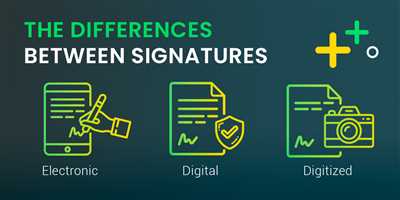
Are you tired of printing out documents just to sign them and then scan them back into your computer? Do you find yourself wondering how to sign contracts and other important papers more easily, quickly, and cost-effectively? Well, we have the perfect solution for you!
With the advancement of technology, there is no need to waste time and money on traditional methods of signing documents. Digitizing your signature allows you to sign papers electronically, saving you the hassle of printing, scanning, and processing. It is a fast and convenient way to sign, and it offers so much more than a traditional signature.
Here is how it works: first, you need to create a digital copy of your signature. You can do this by signing a piece of paper, taking a picture of it, and then opening it on your computer. Alternatively, there are online tools and apps available which offer preconfigured signature templates for you to use. No matter which method you choose, the goal is to create a digital image of your signature.
Once you have a digital copy of your signature, you can easily insert it into any document that requires your signature. By using electronic signatures, you can significantly reduce processing time and costs, both for you and your customers. The convenience of digitally signing documents is unparalleled, and it can save you a minimum of times spent on paperwork throughout the process.
- Digitized Signature: What is it and How to Create One
- What is scanned signature
- Is a scanned signature an electronic signature
- JobSignature – the fast and preconfigured solution for digital signatures
- Map your signature processes digitally throughout
- Reduce processing times to a minimum
- Reduce process costs significantly
- Offer your customers more convenience
- Sources
Digitized Signature: What is it and How to Create One

A digitized signature is essentially an electronic version of your handwritten signature. It allows you to easily sign documents, contracts, and other important papers through online processes.
When you sign a document digitally, you create a digital copy of your signature that can be used throughout various online platforms. It eliminates the need for a physical signature, reducing processing times and costs.
Creating a digitized signature is fast and convenient. There are different ways to do it, but one common method is to scan your handwritten signature and save it as an image on your computer. Then, you can use this image to sign documents electronically.
Another option is to use an online signature solution. There are many platforms available that offer preconfigured signature options to reduce the processing time and cost, as well as provide convenience for both businesses and customers.
Here’s how to create a digitized signature:
- Start by signing your name on a plain white piece of paper.
- Using a scanner or a smartphone, take a picture of your signature.
- Save the scanned image of your signature on your computer. Make sure it is in a format that is compatible with the online platform you will be using.
- Open the document or contract that you need to sign electronically. Look for the designated area where you can insert your signature.
- If you are using an online signature platform, follow the instructions provided to upload your digitized signature. There may be options to adjust the size and position of your signature within the document.
- Once your digitized signature is in place, securely save the document and send it through the appropriate channels.
By creating a digitized signature, you can easily sign documents online without the need for printing, scanning, or physically mailing them. It offers convenience, speed, and significantly reduces costs associated with traditional signing methods.
What is scanned signature

A scanned signature is a digital picture or copy of your handwritten signature that can be easily processed and used throughout various online processes. It is essentially a digitized version of your signature that offers convenience, reduces costs, and speeds up the signing process.
When you sign a document or a contract on paper, it creates a physical copy of your signature. However, with the increasing demand for electronic processes and the need to sign documents online, it is becoming more and more common to digitize signatures.
Scanning your signature allows you to create a digital version that can be used to sign documents electronically using your computer or mobile device. This eliminates the need to print, sign, and scan documents, saving time and reducing the cost of printing and mailing physical copies.
By digitizing your signature, you can easily sign contracts, agreements, and other important documents online, without the need for a physical signature. It also offers a solution for remote work or jobs that require a preconfigured signature for processing.
Scanned signatures can be used in various ways, depending on how and when you need to use them. For example, if you need to sign a document online, you can simply open the document on your computer, insert your scanned signature, and save the file. This allows you to sign documents without the need for printing, signing, and scanning.
In addition, scanned signatures offer the convenience of being able to sign documents electronically from anywhere, at any time. Whether you’re signing a contract for a business deal, a rental agreement, or any other document that requires your signature, you can easily do so with a scanned signature.
Overall, a scanned signature is a cost-effective and time-saving solution that allows businesses and individuals to sign documents electronically, offering convenience and significantly reducing the processing times for contracts and other important paperwork.
Is a scanned signature an electronic signature
Many customers wonder if a scanned signature can be considered an electronic signature. While both the scanned signature and electronic signature have some similarities, there are also key differences between them.
A scanned signature is simply a picture or copy of one’s signature that has been created using a scanner or a camera. This digital image of the signature is then saved as a file on a computer. When a scanned signature is used, it is essentially a preconfigured image that can be inserted into a document or contract. However, it does not offer the same level of security and credibility as an electronic signature.
An electronic signature, on the other hand, is a digital signature that is created using specialized software or online platforms. It involves a more sophisticated process where a unique digital signature is generated using mathematical algorithms. This ensures the authenticity and integrity of the signature, making it more secure and legally binding.
Using electronic signatures offers many advantages over scanned signatures. Firstly, the process of signing documents is significantly faster and more convenient with electronic signatures. Customers can easily sign contracts online, which can reduce processing times and costs associated with printing and handling physical copies of documents.
Furthermore, electronic signatures can be easily integrated into existing processes and workflows. They can be mapped into specific areas of a document and preconfigured to show the customer’s name, date, and other relevant information. This automation of the signing process also helps to reduce errors and ensures consistency throughout the document.
In conclusion, while a scanned signature can be used as a digital representation of one’s handwritten signature, it is not considered a true electronic signature. Electronic signatures offer more security, efficiency, and reduce costs in comparison to scanned signatures. Therefore, it is recommended to opt for an electronic signature solution when possible.
JobSignature – the fast and preconfigured solution for digital signatures
With the increasing reliance on technology in today’s business world, it’s no wonder that digital signatures are becoming more and more popular. The traditional process of signing contracts or important documents can be time-consuming, costly, and inconvenient. However, with JobSignature, all of that changes.
JobSignature offers a fast and preconfigured solution for digital signatures, allowing you to easily create and sign contracts, agreements, and more online. Gone are the days of printing out documents, signing them by hand, and then scanning or mailing them back. With JobSignature, you can digitally sign your documents with just a few simple clicks.
The benefits of using JobSignature are numerous. First and foremost, it significantly reduces processing times. Instead of waiting for your customers or clients to physically sign a document and return it to you, you can simply send them an electronic copy through JobSignature. They can digitally sign it on their computer or mobile device, and then send it back to you in no time at all.
Another advantage of JobSignature is the cost savings. The traditional process of printing, signing, scanning, and mailing documents can be quite expensive. With JobSignature, all of these costs are essentially eliminated. You no longer need to purchase ink, paper, envelopes, or stamps. You can simply create, sign, and send your documents online, saving you both time and money.
JobSignature also offers convenience throughout the entire process. You can easily map out a signature template that will be automatically applied to all of your documents, ensuring that each one is properly signed. You can also configure JobSignature to email you a copy of each signed document, providing you with a digital record of every transaction.
When it comes to the legality and security of digitally signed documents, JobSignature has you covered. Your digital signature is just as legally binding as a physical signature. JobSignature uses advanced encryption technology to ensure the security of your documents and signatures, giving you peace of mind.
In conclusion, JobSignature is the fast and preconfigured solution for digital signatures that you’ve been looking for. It streamlines your processes, reduces costs, and offers convenience and security throughout. Say goodbye to the hassle of scanned and faxed signatures, and say hello to the ease and efficiency of JobSignature.
Map your signature processes digitally throughout
In today’s digital age, it is important to explore ways to streamline and digitize your signature processes. By doing so, you can significantly reduce the time and cost associated with traditional signature methods.
When you naturally sign a document, it is essentially creating a unique copy of your signature. With a digital solution, you can easily create a preconfigured digital signature that can be used for online contracts, processing documents, and more.
One of the key benefits of digitizing your signature is the convenience it offers. Instead of having to print out a document, sign it by hand, and then scan it back into the computer, you can simply open the document on your computer and digitally sign it. This fast and efficient process saves time for both you and your customers.
Digitized signatures are just as legally binding as their handwritten counterparts. By using electronic signatures, you can offer a more cost-effective solution in terms of paper, ink, and scanning costs.
Furthermore, by mapping your signature processes digitally throughout your organization, you can significantly reduce processing times for signed contracts and other important documents. With an online signature solution, you can easily track the progress of signed documents, ensuring that everything is completed in a timely manner.
Overall, digitizing your signature processes is a smart move for any business or individual. It not only reduces costs and processing times but also offers the convenience and security of digital signatures.
Reduce processing times to a minimum
When you digitize your signature, you significantly reduce processing times. Instead of having to map out where on a document your signature needs to go, customers can simply sign contracts and other important documents digitally. This process is much faster as it eliminates the need for customers to print, sign, and scan or mail back a copy of the document.
With a digital signature solution like JobSignature, the entire process is done electronically. Customers can easily create an electronic signature using their computer or even a picture of their handwritten signature. Once the document is signed, it is open throughout the organization for processing, reducing the time it takes to complete jobs or move contracts forward.
Not only does digitizing signatures reduce processing times, but it also offers convenience for both customers and businesses. Customers no longer need to print, sign, and mail documents, saving them time and money on paper and postage costs. Businesses benefit from the convenience of easily accessing signed documents, eliminating the need to search through physical copies or deal with the risk of losing important paperwork.
By using preconfigured templates, the process of signing a document is streamlined, reducing human error and making it more efficient. When a signature is digitized, it can be easily applied to multiple documents without the need for manual copying or scanning.
In summary, digitizing signatures is an essential solution for reducing processing times to a minimum. It eliminates the need for physical copies, reduces costs, and streamlines the signing process. Whether you are a business looking to speed up your processes or an individual wanting a more efficient way to sign documents online, digitizing your signature is the way to go.
Reduce process costs significantly
One of the main advantages of digitizing your signature is the ability to reduce process costs significantly. By implementing an online solution like JobSignature, you can streamline your processes and eliminate the need for physical contracts, documents, and paperwork.
Traditional processes involving paper documents and physical signatures can be time-consuming, costly, and prone to errors. With a digital signature solution, you can create preconfigured templates for contracts and other important documents. This eliminates the need to print, scan, and process physical copies. Instead, customers can easily and conveniently sign documents electronically, directly on their computer or mobile device.
By digitizing your signature, you open up a world of possibilities for your business. You can offer your customers the convenience of signing documents online, from anywhere and at any time. This not only speeds up the process but also allows you to serve customers more efficiently.
The processing time for digitally signed documents is significantly faster compared to traditional paper-based processes. With a few clicks, your customers can sign the document, and you can immediately receive the signed copy. This eliminates the need for manual processing and reduces the overall processing time.
Digitized signatures also offer more security and accuracy. When you digitize your signature, it is essentially mapped to your online profile. This makes it difficult for anyone to copy or forge your signature, ensuring the authenticity of the signed documents.
Additionally, digitizing your signature reduces the cost associated with physical documents, such as printing, paper, and storage. You no longer need to maintain physical copies of contracts and paperwork, as everything can be stored electronically in a secure digital format.
Overall, implementing a digital signature solution like JobSignature can help reduce costs throughout your processes, increase efficiency, and provide a convenient and secure way to create and sign important documents.
Offer your customers more convenience
By implementing a digital signature solution, you can streamline your processes and offer your customers a more convenient way to sign contracts and other important documents. Digitizing your signature reduces the time and cost associated with processing paper copies and allows your customers to sign electronically from the comfort of their own computer.
One of the major benefits of using a digital signature solution is that it significantly speeds up the signing process. Instead of waiting for a physical copy of the document to be mailed or scanned, your customers can quickly and easily sign online. This not only saves time for your customers but also reduces processing times for your business, ultimately leading to cost savings.
When a customer is ready to sign a document, they can simply open the digital signature solution, select their preconfigured signature, and apply it to the document. The solution then maps the signature onto the picture of the document, creating a digital copy that is just as legally binding as a handwritten signature.
Offering digital signatures also provides your customers with more convenience. They no longer have to print, sign, or scan documents, as they can easily sign everything digitally. This convenience is especially beneficial for remote or busy customers who may not have access to a printer or scanner.
Implementing a digital signature solution is a win-win situation for both your business and your customers. It simplifies and accelerates the signing process, reduces costs, and offers your customers the convenience of signing documents digitally. So why not explore how you can digitize your signature and offer your customers more convenience?
Sources
When it comes to digitizing your signature, there are several sources you can turn to for an online solution. Here are some of the main options:
- Scanned Signatures: One way to digitize your signature is to scan a physical copy of it, usually created by signing a piece of paper. You can then save the scanned image on your computer and use it whenever needed.
- Electronic Signature Software: There are many software solutions available that offer preconfigured signature templates. With these tools, you can easily sign documents electronically, reducing the time and cost associated with traditional paper contracts.
- Online Signature Services: There are also online platforms that allow you to sign documents digitally. These services often provide a convenient and user-friendly process for both businesses and customers.
- Digital Signature Hardware: Another option is to invest in specialized hardware, such as a signature pad, that captures your signature and stores it as a digital file.
Regardless of the method you choose, digitizing your signature can significantly reduce the time and costs associated with traditional signing processes. It also offers more convenience for customers and allows you to easily sign documents throughout the entire process.









